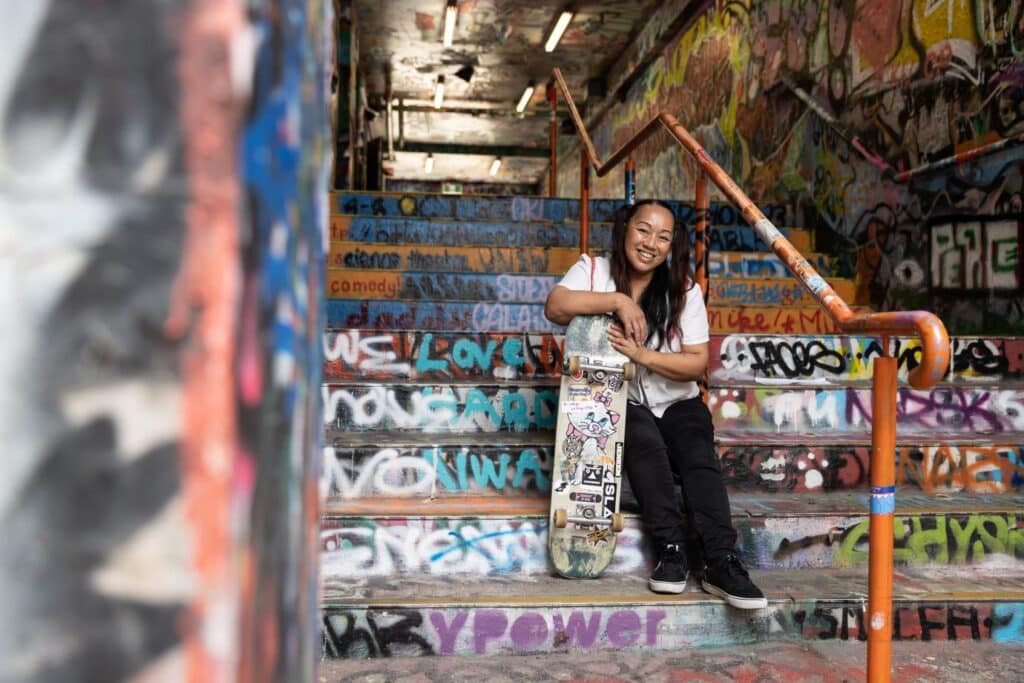There’s no denying Australia is a sport-loving nation. And while we’ve always been fans of mainstream sports like football and swimming, there are some sports that have flown under the radar.
That’s why it’s so exciting to see skateboarding included in the Olympics for the second time following its debut in Tokyo in 2021. Once a youth and subculture activity, it’s now capturing wider attention here in Australia and across the globe.
The best part about it? It’s girls and young women who are increasingly in the limelight.
In the past 12 months, we’ve seen 14-year-old Arisa Trew become the first female skateboarder to land the 720 and 900 tricks, prompting skateboarding legend Tony Hawk to declare: “Glass ceiling SHATTERED.”
Trew is just one of a number of girls and young women who are now leading Australia into the Olympics.
University of Sydney sociologist and skateboarder Dr Indigo Willing has been studying the rise of girls and women in skateboarding, looking at ways we can make the sport more inclusive and innovative, especially at the grassroots level. Her co-researchers include public artist Dr Sanné Mestrom and architecture, design and planning scholar Associate Professor Lian Loke.
“We’re going to be looking towards young women, girls and non-traditional skateboarders as real leaders in the sport, which is amazing in any sport, let alone something as subcultural as skateboarding began,” Dr Willing tells Women’s Agenda.
There are five girls or women who’ve been selected as part of Australia’s Olympic Team for Paris, including Arisa Trew, Ruby Trew, Chloe Covell, Liv Lovelace and Haylie Powell.
“Skateboarding has gone from being a youth and subculture activity to now being included in the Olympic Games, and we will see Australians on the podium this year. The girls are outstanding and have been breaking records,” Dr Willing said.
“Integrating women’s skating and skateboarders into the public conversation, like the Olympics is doing, is important.”
Dr Willing is closely connected to the skateboarding community and says lots of young girls and marginalised people are attracted to skateboarding “due to its creativity, permission to take risks and lack of set rules or fees, things that may create barriers in other sports”.
Women and girls need to feel safe at skate parks
While the Olympics is going to propel skateboarding opportunities to greater levels for women and girls, especially when it comes to things like pay parity, the grassroots is where we really need to see better conditions for women and girls.
“At the grassroots, it really is making sure that there are spaces for girls and women and non-traditional skateboarders to feel safe when they rock up at the skate park,” Dr Willing says. “And that includes having things like support for women’s coaches, support for facilities like toilets and lighting.”
“A lot of women, especially if they go skateboarding after work, won’t want to go to some isolated skate park with a dark car park, with nowhere to sit, nowhere to put their bags and nowhere to go to the toilet. That’s a huge barrier for everybody, really, but especially for women thinking about their safety.”
“And so when councils plan these things, they need to get women on board. My research at the University of Sydney is really pushing for those micro level details to be thought of. The full participation requires women and girls in all different roles, from design to coaching to judging, to doing media.”
Dr Willing says it’s been excellent to see high-profile men like Tony Hawk getting behind girls in skateboarding, but the place where we need to see more positivity is at the local skate park.
“What we need to change is the average dude at the skate park who might be with his mates and think it’s really funny to laugh at the girls or say something sexist.
“We need to change those attitudes to get more girls reaching their full potential, whether that’s recreationally or all the ways to the Olympics.”
Feature image: Dr Indigo Willing at the University of Sydney. Photo credit: Stefanie ZingSheim.

